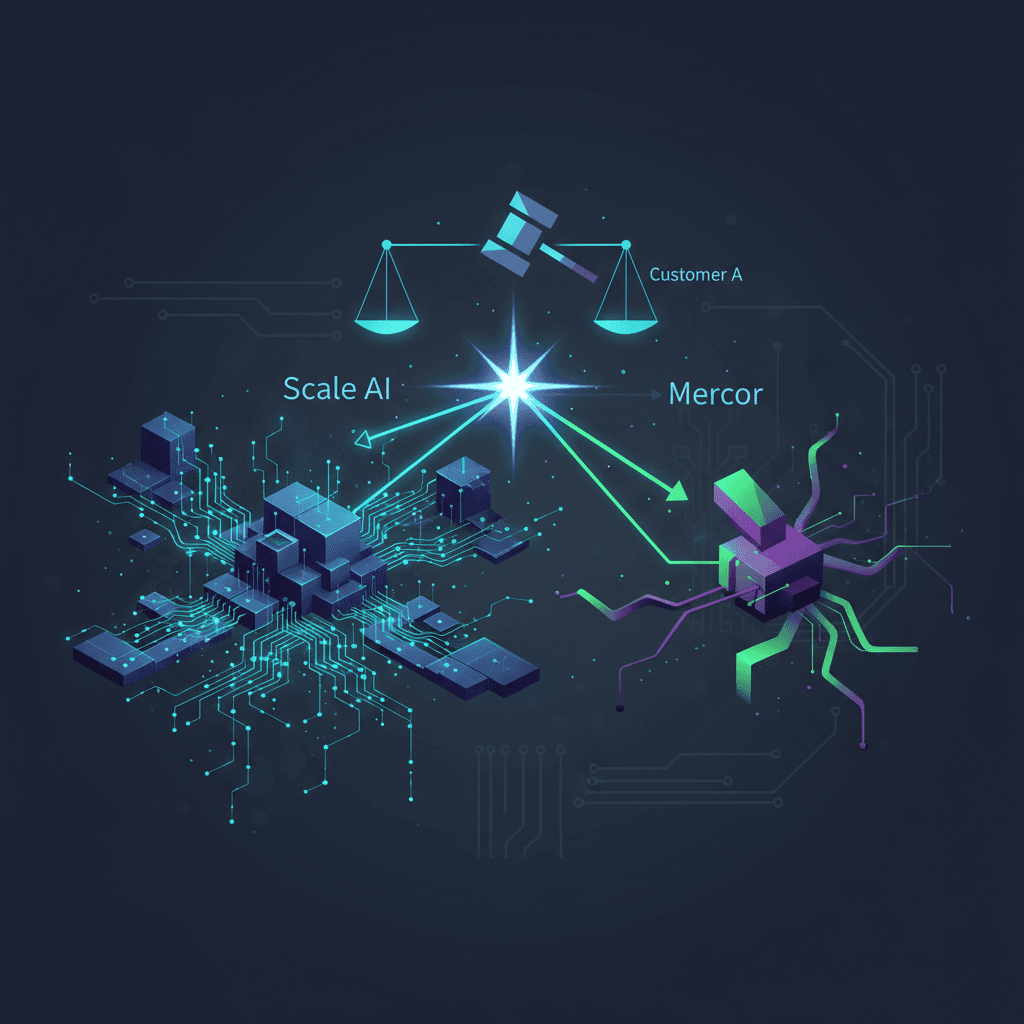Scale AI Accuses Rival Mercor of Corporate Espionage in Data Labeling War
Allegations of stolen AI data strategies and client poaching ignite a high-stakes legal battle in the booming annotation market.
September 4, 2025

A fierce legal battle has erupted in the heart of the artificial intelligence industry, as data-labeling giant Scale AI has filed a lawsuit against a smaller rival, Mercor, and a former employee, alleging a brazen scheme to steal confidential documents and poach a key client. The lawsuit, filed in a California court, accuses former Scale AI executive Eugene Ling of downloading more than 100 sensitive documents related to customer strategies before joining Mercor, a fast-rising startup.[1][2] This legal confrontation highlights the cutthroat competition in the critical, high-stakes market for data annotation, the foundational work that fuels the development of advanced AI models. In a statement reflecting the gravity of the allegations, Scale AI declared, “We won’t allow anyone to take unlawful shortcuts at the expense of our business.”
At the core of the dispute are claims of trade secret misappropriation, breach of contract, and corporate espionage.[3][4] According to the 28-page legal complaint, Ling, who served as Scale AI's head of engagement management, allegedly began collaborating with Mercor while still employed at Scale.[5][2] The lawsuit contends that in the weeks leading up to his departure, Ling transferred proprietary files concerning Scale's business strategies to a personal Google Drive.[6][7] Crucially, Scale AI alleges that a significant number of these documents pertained to a major, undisclosed client referred to in court filings as "Customer A."[5][1] The complaint further asserts that Ling was actively pitching Mercor's services to this client, a contract potentially worth millions of dollars, before his official exit from Scale.[5][3] This alleged act of soliciting a major customer while still an employee represents a serious breach of duty, according to the suit.[8] Scale AI is seeking damages, legal costs, and a court order to prevent Mercor from using the allegedly stolen information and to bar Ling from working with "Customer A."[4][9]
In response to the serious allegations, Mercor's leadership has publicly pushed back, denying any illicit use of its competitor's trade secrets.[3] Mercor co-founder Surya Midha acknowledged that the company had hired Ling and other former Scale employees but maintained that Mercor has no interest in its rival's confidential information and is "intentionally running our business in a different way."[6] Midha stated that Ling had informed them about having "old documents in a personal Google Drive," which he claims Mercor never accessed.[3] Furthermore, Midha revealed that Mercor had contacted Scale six days prior to the lawsuit being filed, offering to have Ling destroy the files or find another resolution, a proposal Scale evidently rejected.[3] Scale characterized this offer as an attempt to destroy key evidence.[8] Mercor, which has been gaining traction by providing highly specialized experts like PhDs and lawyers for complex data labeling tasks, views itself as a disruptor in a market long dominated by Scale AI.[10][7] The startup's business model focuses on matching elite human expertise with the needs of AI labs to train sophisticated models, a niche that puts it in direct competition with Scale's broader data annotation services.[11][12]
This lawsuit does not exist in a vacuum but is emblematic of a broader, intensifying war for talent and intellectual property within the booming AI industry. As the value of proprietary data and skilled personnel skyrockets, legal disputes over trade secrets have become increasingly common. The Scale AI-Mercor conflict echoes other recent high-profile cases, such as Elon Musk's xAI suing a former employee for allegedly taking confidential information to a competitor.[1] These legal battles underscore the immense pressure companies face to protect their competitive edge in a rapidly evolving technological landscape. The situation at Scale AI is further complicated by its own recent corporate shake-ups, including a massive $14.3 billion investment from Meta for a 49% stake.[5][6] This deal reportedly led to an exodus of some major clients concerned about conflicts of interest, heightening the importance for Scale of retaining its remaining customers and vigorously defending its intellectual property.[6]
The outcome of the lawsuit between Scale AI and Mercor could have significant ramifications for the AI data industry, potentially setting new precedents for how trade secrets are protected and how employee transitions between rival firms are managed.[4] For Scale AI, the legal action is a defensive maneuver aimed at protecting its market position amidst growing competition and internal pressures.[8] For Mercor, the lawsuit represents a major challenge to its reputation and its ability to compete as an emerging force in the data-labeling space. As the legal proceedings unfold, the case will be closely watched by industry observers, investors, and legal experts alike. It serves as a stark reminder that in the gold rush of artificial intelligence, the most valuable assets are often the intangible ones: proprietary data, innovative strategies, and the trust of major clients. The resolution of this dispute will likely influence how companies across the AI ecosystem navigate the delicate balance between fostering innovation and safeguarding the secrets that drive their success.